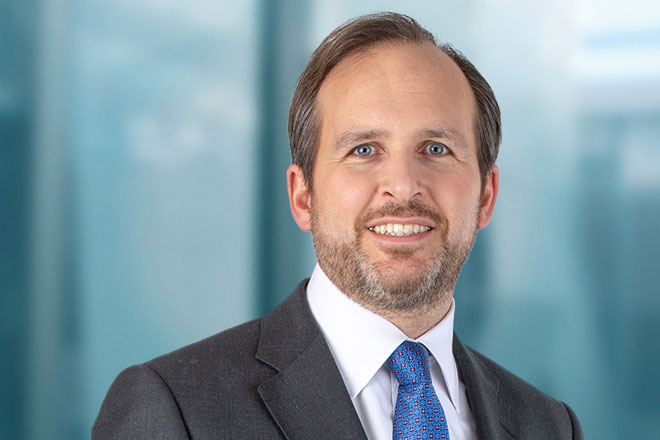What it takes to be an effective sustainability advocate
As Head of SRI, Hamish Chamberlayne, champions sustainability every day. It takes authenticity and a desire to take part in resolving real world issues to make any meaningful dent in environmental and social challenges.

2 minute read
An avid follower of any news, reports and other information on sustainability, Hamish sees the environmental and social woes of the world around him. Yet he is fortunate enough to be able to do something positive to effect real change while striving to be the best portfolio manager and aiming to deliver good returns for his clients.
In his role as Head of SRI at Janus Henderson Investors, and Portfolio Manager of the firm’s US$1.3 billion* Global Sustainable Equity Strategy, Chamberlayne can exert an influence via the strategy’s investment process by allocating capital towards companies that are playing a positive role in the transformation of the global economy – and avoiding investing those which do harm. This is not a new perspective for the strategy, as it has been operating with these principles since 1991.
Being an advocate on sustainability matters does not mean a confrontational relationship with companies. Instead, the strategy’s investment principles can lead to partnerships with the companies it invests, in where Hamish Chamberlayne and his team can work with management on its continual improvement and sustainability journey.
Take the engagement of the Global Sustainable Equity Team on net zero carbon.
With low carbon investing central to its philosophy, the Global Sustainable Equity Team joined the Net Zero Carbon 10 initiative. The initiative sets ambitious yet achievable targets for carbon reduction to help prevent the disastrous and irreversible consequences of climate change.
This enables investment managers to better align their investment policies to the requirement for carbon neutrality, rather than just emissions reduction. The approach focuses on net zero emissions based on scope one, two and three emissions.
The team has since found that beginning this initiative has led to more focused discussions with companies that have begun a low-carbon journey but do not have a target to achieve neutrality by 2030. This engagement has been positively received, strengthening the team’s relationship and dialogue with the companies it invests in.
All this doesn’t come easily. Having a positive impact on the wider economy is only possible by moving past just analysing companies. One must engage and collaborate with firms, colleagues and even sometimes competitors to ensure positive outcomes for people and the planet, all with the intention of making a profit.
*As at 30 June 2019.
Janus Henderson investors
These are the views of the author at the time of publication and may differ from the views of other individuals/teams at Janus Henderson Investors. References made to individual securities do not constitute a recommendation to buy, sell or hold any security, investment strategy or market sector, and should not be assumed to be profitable. Janus Henderson Investors, its affiliated advisor, or its employees, may have a position in the securities mentioned.
Past performance does not predict future returns. The value of an investment and the income from it can fall as well as rise and you may not get back the amount originally invested.
The information in this article does not qualify as an investment recommendation.
Marketing Communication.
Important information
Please read the following important information regarding funds related to this article.
- Shares/Units can lose value rapidly, and typically involve higher risks than bonds or money market instruments. The value of your investment may fall as a result.
- Shares of small and mid-size companies can be more volatile than shares of larger companies, and at times it may be difficult to value or to sell shares at desired times and prices, increasing the risk of losses.
- The Fund follows a sustainable investment approach, which may cause it to be overweight and/or underweight in certain sectors and thus perform differently than funds that have a similar objective but which do not integrate sustainable investment criteria when selecting securities.
- The Fund may use derivatives with the aim of reducing risk or managing the portfolio more efficiently. However this introduces other risks, in particular, that a derivative counterparty may not meet its contractual obligations.
- If the Fund holds assets in currencies other than the base currency of the Fund, or you invest in a share/unit class of a different currency to the Fund (unless hedged, i.e. mitigated by taking an offsetting position in a related security), the value of your investment may be impacted by changes in exchange rates.
- When the Fund, or a share/unit class, seeks to mitigate exchange rate movements of a currency relative to the base currency (hedge), the hedging strategy itself may positively or negatively impact the value of the Fund due to differences in short-term interest rates between the currencies.
- Securities within the Fund could become hard to value or to sell at a desired time and price, especially in extreme market conditions when asset prices may be falling, increasing the risk of investment losses.
- The Fund could lose money if a counterparty with which the Fund trades becomes unwilling or unable to meet its obligations, or as a result of failure or delay in operational processes or the failure of a third party provider.
- In respect of the equities portfolio within the Fund, this follows a value investment style that creates a bias towards certain types of companies. This may result in the Fund significantly underperforming or outperforming the wider market.
